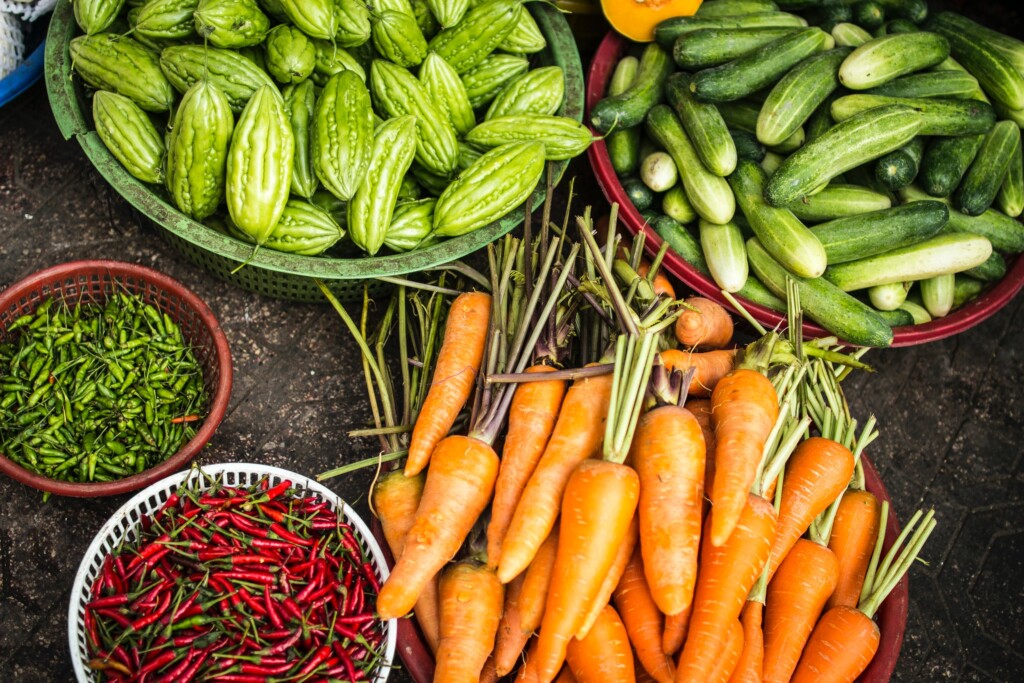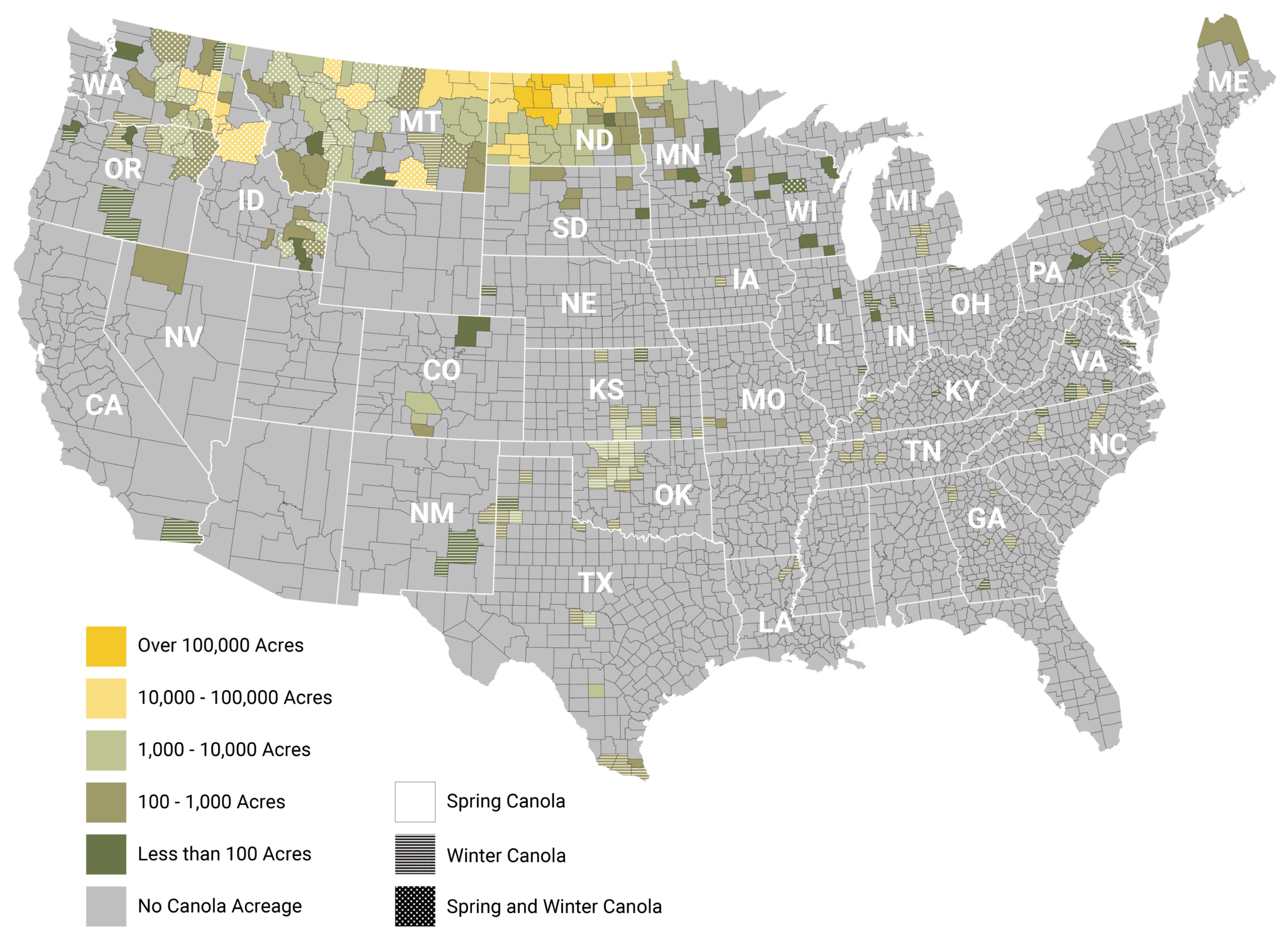Canola Quick Bytes
A supplement to U.S. Canola Digest
Capitol Hill
 The U.S. Canola Association joined Clean Fuels Alliance America, the American Soybean Association and National Oilseed Processors Association in urging the Biden Administration to adopt the U.S. Department of Energy’s GREET (Greenhouse gases, Regulated Emissions, and Energy use in Technologies) model to calculate greenhouse gas reductions for the sustainable aviation fuel tax credit. The groups wrote a letter to White House Senior Advisor John Podesta stating that it is “inconceivable” for the government to encourage clean energy through incentives but discourage the use of homegrown, low-carbon feedstocks like canola and soy at the same time. The U.S. Canola Association joined Clean Fuels Alliance America, the American Soybean Association and National Oilseed Processors Association in urging the Biden Administration to adopt the U.S. Department of Energy’s GREET (Greenhouse gases, Regulated Emissions, and Energy use in Technologies) model to calculate greenhouse gas reductions for the sustainable aviation fuel tax credit. The groups wrote a letter to White House Senior Advisor John Podesta stating that it is “inconceivable” for the government to encourage clean energy through incentives but discourage the use of homegrown, low-carbon feedstocks like canola and soy at the same time.
Congress continues to grapple with the end of the federal fiscal year (Sept. 30) deadline to pass a Continuing Resolution to avoid a government shutdown. One effect of the stand-off is that the House of Representatives is considering significant cuts to the agriculture appropriations bill, including reducing food aid programs by more than $1 billion and everything by 14%. Such cuts would be a non-starter with the Senate but would serve as a negotiation tactic for the House.
 In response to a request from Senate Agriculture Committee Chair Debbie Stabenow (D-MI) and Ranking Member John Boozman (R-AR), the U.S. Department of Agriculture (USDA) has informed the House and Senate Agriculture Committees that they will tap the Commodity Credit Corporation (CCC) to provide $1.4 billion for export marketing and $1.06 billion for commodity-based food aid. The $1.4 billion for export marketing and trade promotion represents a doubling or more of the existing Market Access Program and Foreign Market Development funding, which has been a goal of many agricultural groups. The USDA will reportedly implement these funds through a newly named Regional Agricultural Promotion Program. Funding for these programs through the CCC could relieve one of the funding demands of the pending farm bill. For food aid funds, the USDA has indicated that $1.06 billion will be provided to “address global hunger through in-kind donations” using surplus commodities. In response to a request from Senate Agriculture Committee Chair Debbie Stabenow (D-MI) and Ranking Member John Boozman (R-AR), the U.S. Department of Agriculture (USDA) has informed the House and Senate Agriculture Committees that they will tap the Commodity Credit Corporation (CCC) to provide $1.4 billion for export marketing and $1.06 billion for commodity-based food aid. The $1.4 billion for export marketing and trade promotion represents a doubling or more of the existing Market Access Program and Foreign Market Development funding, which has been a goal of many agricultural groups. The USDA will reportedly implement these funds through a newly named Regional Agricultural Promotion Program. Funding for these programs through the CCC could relieve one of the funding demands of the pending farm bill. For food aid funds, the USDA has indicated that $1.06 billion will be provided to “address global hunger through in-kind donations” using surplus commodities.
The Biden Administration has taken several actions relating to the H2A labor program, including the U.S. Department of Labor proposing a new rule Sept. 12 to strengthen protection for temporary workers, program compliance and enforcement. The proposed rule would clarify when a termination is “for cause,” specify six conditions to do so and make foreign labor recruitment more transparent. It would also require employers to provide a copy of all agreements to recruiters of prospective H-2A workers and prohibit employers from holding or confiscating workers’ identification documents. The USDA subsequently announced the Farm Labor Stabilization and Protection Pilot Program will provide $65 million in grants to employers in amounts from $25,000 to $2 million to recruit and retain H2A workers, improve working conditions and facilitate lawful migration pathways. “This pilot should be a win for everyone along the agricultural supply chain, from the field to the dinner table,” says Secretary of Agriculture Tom Vilsack.
 On Sept. 25, U.S. Senators Amy Klobuchar (D-MN) and John Hoeven (R-ND) introduced the Producer and Agricultural Credit Enhancement (PACE) Act to improve farmers and ranchers’ access to credit by modernizing limitations for USDA loan programs. “Our legislation will help credit programs to keep pace with the current needs of producers so they have access to the capital they need to support their operations and ensure Americans have access to the food and fuel we need,” says Hoeven. The PACE Act is supported by the U.S. Canola Association among nearly 20 agricultural groups. On Sept. 25, U.S. Senators Amy Klobuchar (D-MN) and John Hoeven (R-ND) introduced the Producer and Agricultural Credit Enhancement (PACE) Act to improve farmers and ranchers’ access to credit by modernizing limitations for USDA loan programs. “Our legislation will help credit programs to keep pace with the current needs of producers so they have access to the capital they need to support their operations and ensure Americans have access to the food and fuel we need,” says Hoeven. The PACE Act is supported by the U.S. Canola Association among nearly 20 agricultural groups.
Agronomy
 Northern Canola Growers Association board member Pat Murphy told Red River Farm Network in its “Canola Minute” that although the season was a little dry, the canola harvest is looking great, and growers are very happy with their yields. Murphy estimates that 95 percent of canola in his area is being straight cut this year. Northern Canola Growers Association board member Pat Murphy told Red River Farm Network in its “Canola Minute” that although the season was a little dry, the canola harvest is looking great, and growers are very happy with their yields. Murphy estimates that 95 percent of canola in his area is being straight cut this year.
North Dakota canola yields are higher than expected this season, reports AgWeek. Yields are as high as a record 3,500 pounds an acre and as low as 2,200 pounds, notes Barry Coleman, executive director of the Northern Canola Growers Association. “Overall, people have been very pleased with the yields,” he says.
Nutrition
 A new Canadian study published in the Journal of Animal Feed Science and Technology found that replacing canola meal with an enzymatically modified counterpart positively affected gut health in broiler chickens. Researchers concluded this benefit was linked to an increase in probiotic organisms. A new Canadian study published in the Journal of Animal Feed Science and Technology found that replacing canola meal with an enzymatically modified counterpart positively affected gut health in broiler chickens. Researchers concluded this benefit was linked to an increase in probiotic organisms.
Other Country News
 The Canadian government is paying close attention to Mexico’s potential ban on genetically modified (GM) corn. U.S. Trade Representative Katherine Tai requested dispute settlement consultations with Mexico in response to a decree to phase out biotech corn in all products for human production and animal feed. Although canola was not mentioned in the decree, the Canadian government is concerned the Mexican government will try to ban it along with other GM crops. Canada exported around $1.6 billion in canola products to Mexico in 2022 so significant trade is at stake. The Canadian government is paying close attention to Mexico’s potential ban on genetically modified (GM) corn. U.S. Trade Representative Katherine Tai requested dispute settlement consultations with Mexico in response to a decree to phase out biotech corn in all products for human production and animal feed. Although canola was not mentioned in the decree, the Canadian government is concerned the Mexican government will try to ban it along with other GM crops. Canada exported around $1.6 billion in canola products to Mexico in 2022 so significant trade is at stake.
Due to hot and dry weather conditions, Canada’s canola crops have been suffering. The second largest producing providence, Alberta, has had severe drought, significantly impacting yields of canola and other crops.
 The European Commission has recognized Australian canola’s low-emission credentials for its biofuel market a second time, giving the country-continent’s growers continued access to the European Union (EU). These credentials were determined by CSIRO, Australia’s national science agency, which looked at greenhouse gas emissions from every stage of Australian canola production. Australia is a major supplier of canola for the EU biodiesel market, exporting more than 1.8 million tonnes annually. Canola is now the second largest crop after wheat in Australia. The European Commission has recognized Australian canola’s low-emission credentials for its biofuel market a second time, giving the country-continent’s growers continued access to the European Union (EU). These credentials were determined by CSIRO, Australia’s national science agency, which looked at greenhouse gas emissions from every stage of Australian canola production. Australia is a major supplier of canola for the EU biodiesel market, exporting more than 1.8 million tonnes annually. Canola is now the second largest crop after wheat in Australia.
Nearly 100 international delegates and more from across Australia gathered in New South Wales on Sept. 22 for a canola field day that opened the 16th International Rapeseed Congress. Held at the Wagga Wagga Agricultural Institute, the event featured hundreds of legacy, current and developing canola varieties that show the evolution of the Australian canola industry. After Canada, Australia is the world’s second largest exporter of canola.
Latest Industry News
 The canola fight continues in Oregon’s Willamette Valley, where vegetable seed producers proposed two options on Sept. 19 in final negotiations among state farm regulators: 1) ban genetically modified (GM) canola and remove the 500-acre limit on the crop in the region or 2) grow GM canola with stricter limits and retain the cap on acreage. Canola proponents are not happy about either possibility. “I believe coexistence is possible, it’s just trying to hammer out what it looks like to everyone,” says Lauren Henderson, acting director of the Oregon Department of Agriculture. “I’m encouraging you all to keep talking and be unified rather than not.” The canola fight continues in Oregon’s Willamette Valley, where vegetable seed producers proposed two options on Sept. 19 in final negotiations among state farm regulators: 1) ban genetically modified (GM) canola and remove the 500-acre limit on the crop in the region or 2) grow GM canola with stricter limits and retain the cap on acreage. Canola proponents are not happy about either possibility. “I believe coexistence is possible, it’s just trying to hammer out what it looks like to everyone,” says Lauren Henderson, acting director of the Oregon Department of Agriculture. “I’m encouraging you all to keep talking and be unified rather than not.”
The Northern Canola Growers Association (NCGA) will hold its annual meeting in conjunction with the U.S. Durum Growers Association at the Crop Outlook and International Durum Forum Nov. 1-2 at the Grand Hotel in Minot, N.D. The NCGA will hold canola informational meetings in the afternoon of Nov. 1 and keynote speakers will be former U.S. Representative Colin Peterson (invited) and Jacob Shapiro, partner and director of geopolitical analysis at Cognitive Investments.
Mark your calendars! In partnership with the Canola Council of Canada, the 5th annual Canadian Crop Convention will be March 5-7, 2024 at the Fairmont Hotel in Winnipeg. There are no registration details yet, but questions can be directed to Whitney Dencklau at dencklauw@canolacouncil.org.
About the USCA
The U.S. Canola Association (USCA) will host its fall board meeting in St. Louis, Mo., Oct. 29-31 in conjunction with the National Canola Research Conference and 2023 ASA, CSSA, SSSA International Annual Meeting.
Save the date! The spring 2024 USCA meeting will be held in Washington, D.C., March 18-20 at the Hyatt House on The Wharf.
 Want to see exactly where canola is growing in the United States? The USCA just uploaded a new canola acreage map by county on its website. Want to see exactly where canola is growing in the United States? The USCA just uploaded a new canola acreage map by county on its website.
Get social with us on Instagram, LinkedIn, Facebook, Twitter and YouTube.
Want to promote your products or services to canola producers and industry members? Visit our advertising pages to find specs, deadlines and rates to advertise in this monthly e-newsletter or on UScanola.com.
|
 The U.S. Canola Association joined Clean Fuels Alliance America, the American Soybean Association and National Oilseed Processors Association in urging the Biden Administration to adopt the U.S. Department of Energy’s GREET (Greenhouse gases, Regulated Emissions, and Energy use in Technologies) model to calculate greenhouse gas reductions for the sustainable aviation fuel tax credit. The groups wrote a letter to White House Senior Advisor John Podesta stating that it is “inconceivable” for the government to encourage clean energy through incentives but discourage the use of homegrown, low-carbon feedstocks like canola and soy at the same time.
The U.S. Canola Association joined Clean Fuels Alliance America, the American Soybean Association and National Oilseed Processors Association in urging the Biden Administration to adopt the U.S. Department of Energy’s GREET (Greenhouse gases, Regulated Emissions, and Energy use in Technologies) model to calculate greenhouse gas reductions for the sustainable aviation fuel tax credit. The groups wrote a letter to White House Senior Advisor John Podesta stating that it is “inconceivable” for the government to encourage clean energy through incentives but discourage the use of homegrown, low-carbon feedstocks like canola and soy at the same time. In response to a request from Senate Agriculture Committee Chair Debbie Stabenow (D-MI) and Ranking Member John Boozman (R-AR), the U.S. Department of Agriculture (USDA) has informed the House and Senate Agriculture Committees that they will tap the Commodity Credit Corporation (CCC) to provide $1.4 billion for export marketing and $1.06 billion for commodity-based food aid. The $1.4 billion for export marketing and trade promotion represents a doubling or more of the existing Market Access Program and Foreign Market Development funding, which has been a goal of many agricultural groups. The USDA will reportedly implement these funds through a newly named Regional Agricultural Promotion Program. Funding for these programs through the CCC could relieve one of the funding demands of the pending farm bill. For food aid funds, the USDA has indicated that $1.06 billion will be provided to “address global hunger through in-kind donations” using surplus commodities.
In response to a request from Senate Agriculture Committee Chair Debbie Stabenow (D-MI) and Ranking Member John Boozman (R-AR), the U.S. Department of Agriculture (USDA) has informed the House and Senate Agriculture Committees that they will tap the Commodity Credit Corporation (CCC) to provide $1.4 billion for export marketing and $1.06 billion for commodity-based food aid. The $1.4 billion for export marketing and trade promotion represents a doubling or more of the existing Market Access Program and Foreign Market Development funding, which has been a goal of many agricultural groups. The USDA will reportedly implement these funds through a newly named Regional Agricultural Promotion Program. Funding for these programs through the CCC could relieve one of the funding demands of the pending farm bill. For food aid funds, the USDA has indicated that $1.06 billion will be provided to “address global hunger through in-kind donations” using surplus commodities.  On Sept. 25, U.S. Senators Amy Klobuchar (D-MN) and John Hoeven (R-ND) introduced the Producer and Agricultural Credit Enhancement (PACE) Act to improve farmers and ranchers’ access to credit by modernizing limitations for USDA loan programs. “Our legislation will help credit programs to keep pace with the current needs of producers so they have access to the capital they need to support their operations and ensure Americans have access to the food and fuel we need,” says Hoeven. The PACE Act is supported by the U.S. Canola Association among nearly 20 agricultural groups.
On Sept. 25, U.S. Senators Amy Klobuchar (D-MN) and John Hoeven (R-ND) introduced the Producer and Agricultural Credit Enhancement (PACE) Act to improve farmers and ranchers’ access to credit by modernizing limitations for USDA loan programs. “Our legislation will help credit programs to keep pace with the current needs of producers so they have access to the capital they need to support their operations and ensure Americans have access to the food and fuel we need,” says Hoeven. The PACE Act is supported by the U.S. Canola Association among nearly 20 agricultural groups.


 Northern Canola Growers Association board member Pat Murphy told
Northern Canola Growers Association board member Pat Murphy told  A new Canadian study published in the
A new Canadian study published in the 
 The European Commission has recognized Australian canola’s low-emission credentials for its biofuel market a second time, giving the country-continent’s growers continued access to the European Union (EU). These credentials were determined by
The European Commission has recognized Australian canola’s low-emission credentials for its biofuel market a second time, giving the country-continent’s growers continued access to the European Union (EU). These credentials were determined by  The canola fight continues in Oregon’s Willamette Valley, where vegetable seed producers proposed two options on Sept. 19 in final negotiations among state farm regulators: 1) ban genetically modified (GM) canola and remove the 500-acre limit on the crop in the region or 2) grow GM canola with stricter limits and retain the cap on acreage. Canola proponents are not happy about either possibility. “I believe coexistence is possible, it’s just trying to hammer out what it looks like to everyone,” says Lauren Henderson, acting director of the
The canola fight continues in Oregon’s Willamette Valley, where vegetable seed producers proposed two options on Sept. 19 in final negotiations among state farm regulators: 1) ban genetically modified (GM) canola and remove the 500-acre limit on the crop in the region or 2) grow GM canola with stricter limits and retain the cap on acreage. Canola proponents are not happy about either possibility. “I believe coexistence is possible, it’s just trying to hammer out what it looks like to everyone,” says Lauren Henderson, acting director of the  Want to see exactly where canola is growing in the United States? The USCA just uploaded a new canola acreage map by county on its
Want to see exactly where canola is growing in the United States? The USCA just uploaded a new canola acreage map by county on its